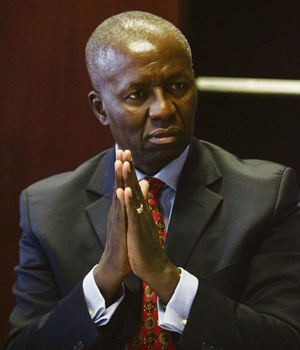
Deputy Chief Justice Dikgang Moseneke says he will not respond to criticism levelled at the judiciary by senior tripartite alliance politicians, although he is convinced they have no factual basis.
“I won’t respond to what politicians say. Frankly, I work for you and I account to you,” Moseneke told a packed lecture hall at the University of the Western Cape’s inaugural Law Dean’s Distinguished Lecture on Friday.
Moseneke had been asked a question about the recent criticism of the judiciary by, among others, ANC secretary-general Gwede Mantashe and SA Communist Party leader Blade Nzimande.
They said the judiciary was “reaching” into the executive and legislative arms of state.
“Let me tell you, I’m not going to answer any of those criticisms because they have no factual basis, to put it very, very mildly,” said Moseneke.
The deputy chief justice was speaking only two days after former Constitutional Court Justice Yvonne Mokgoro also spoke out in defence of the judiciary.
Speaking at a lecture to honour the late former education minister Kader Asmal on Tuesday night, Mokgoro said she was still in shock over what appeared to be a blatant disregard for the court order to arrest Sudan’s president, Omar al-Bashir.
Mokgoro said it was incumbent upon the executive to implement judicial decisions.
She quoted late Chief Justice Ismail Mahomed when he stated that if court orders were disregarded, “the courts could easily be reduced to paper tigers with a ferocious capacity to snarl and roar, but no teeth with which to bite and no sinews to execute their judgments, which may then be mockingly reduced to pieces of sterile scholarship, toothless wisdom and pious poetry”.
Mokgoro said the fact that judges were not elected must be seen as an important strength of the judicial system, rather than its weakness.
“For me, it reinforces the impartially interventionist and protective role of the courts.
“Here, there is no room for populism. Personal views and positions are irrelevant. That is the role mandated to the judiciary by the Constitution.”
She admitted that judges were human and not infallible. “However, errors in law and fact can be appealed to the highest court through the hierarchy of courts. That too is the case when a judge has overreached herself or himself. That is the discipline the rule of law requires of each litigant who comes before the courts and is aggrieved by court decisions.”
Moseneke said South Africa was in a period of transition, but that his “own trust and faith still remain”.
“I’m not about to cave in or give up, not just as a judge but as a South African.
“I think we’re going to turn the corner. I think we’re going to come right and I think, over time, all of us will mature in a variety of ways in how we run government, how we put people in positions of power, how we appoint judges and how we train them. I think we are on a good wicket.”
In the course of the lecture, Moseneke referenced several quotes by Nelson Mandela, who he said was a father figure to him when he was imprisoned on Robben Island with the statesman at the age of just 15.
Moseneke said there would always be tension between the executive, the judiciary and the legislature because South Africa had an “interlocking” constitutional arrangement that meant no branch of government left the other untouched.
“The branches of government are not in competition with each other. Rather, they are symbiotic, or so the Constitution intends. They are part of a beautiful mosaic that can only work if we bring our best selves to the fore,” said Moseneke.
He said much was made of rulings against the legislature and the executive when these were really just a small part of the work that courts did every day.
Moseneke also said it was only fair to acknowledge that South Africa was a functioning democracy because “by and large, we have made orders and the government has complied”.
He said a “close reading and nuanced understanding” confirmed that South Africa’s courts had acted within the ambit of the separation of powers.
“I do not think our courts have crossed the line of the separation of powers.
“If anything, our judiciary, over 21 years, has shown it has been meticulous not to tread on the domain of the executive or the legislature,” said Moseneke.




 Publications
Publications
 Partners
Partners








